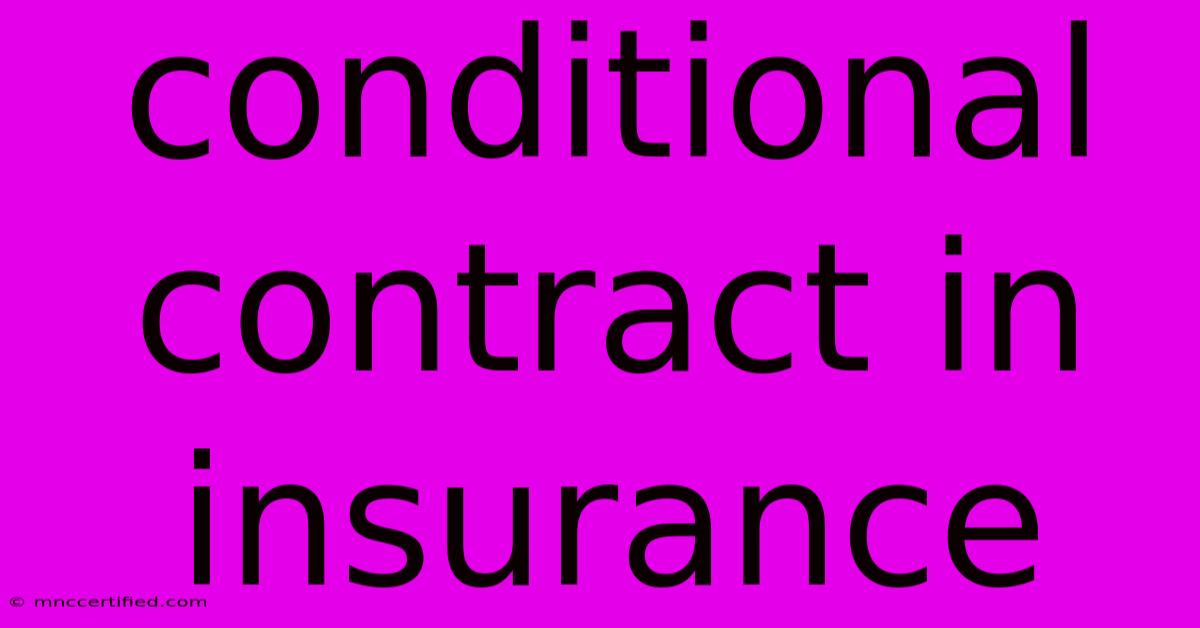Conditional Contract In Insurance

Table of Contents
Understanding Conditional Contracts in Insurance
Insurance policies are fundamentally conditional contracts. This means that the insurer's promise to pay benefits is contingent upon the fulfillment of certain conditions by the policyholder. Understanding these conditions is crucial for both policyholders and insurers to avoid disputes and ensure the smooth processing of claims. This article will delve into the intricacies of conditional contracts in insurance, exploring common conditions and their implications.
What Makes an Insurance Contract Conditional?
Unlike unconditional contracts where obligations are absolute, insurance contracts are inherently conditional because the occurrence of the insured event is uncertain. The insurer's obligation to pay arises only when a specified event, such as an accident, illness, or death, occurs and meets the terms and conditions outlined in the policy. This uncertainty is the foundation of the insurance principle, enabling risk transfer from the individual to the insurer.
Key Conditions in Insurance Contracts:
Several critical conditions typically govern insurance contracts, impacting the insurer's liability and the policyholder's rights. These include:
-
Payment of Premiums: This is arguably the most fundamental condition. The insurer's obligation to provide coverage is usually dependent on the timely payment of premiums by the insured. Failure to pay premiums can lead to policy lapse and termination of coverage.
-
Disclosure of Material Facts: Insurance policies hinge on the principle of utmost good faith. Policyholders have a legal duty to disclose all material facts relevant to the risk being insured. Failing to disclose material information, even unintentionally, can lead to the insurer voiding the policy or reducing the payout in case of a claim.
-
Compliance with Policy Terms: Insurance policies often contain specific conditions regarding how the insured must act in the event of a loss. This might include reporting the loss promptly, cooperating with investigations, or taking steps to mitigate further damage. Non-compliance can impact the claim settlement.
-
Insurable Interest: A valid insurance contract requires the policyholder to possess an insurable interest in the subject matter of the insurance. This means the policyholder must stand to suffer a financial loss should the insured event occur. For example, you must have an insurable interest in your house to insure it against damage.
Common Examples of Conditional Clauses
Let's look at specific examples of how conditions play out in different insurance types:
-
Health Insurance: Many health insurance policies have conditions related to pre-existing conditions, waiting periods before coverage begins, and the need for authorization for certain procedures. These conditions shape the extent of coverage.
-
Auto Insurance: Auto insurance policies may contain conditions regarding driving under the influence, failure to report accidents promptly, or modifications to the vehicle that weren't disclosed. Breaching these conditions can void coverage.
-
Life Insurance: Life insurance policies often contain conditions regarding the cause of death (e.g., exclusions for suicide within a specific timeframe).
Consequences of Breach of Condition
Failure to meet the conditions of an insurance policy can have significant consequences, including:
- Policy Lapse: Non-payment of premiums typically results in policy lapse, leaving the insured without coverage.
- Claim Denial: Non-compliance with policy terms, such as failure to report a loss promptly, can lead to a claim denial.
- Policy Voidance: In cases of fraudulent misrepresentation or non-disclosure of material facts, the insurer might void the entire policy, rendering it unenforceable.
- Reduced Payout: Even if a claim isn't denied entirely, failure to meet certain conditions could lead to a reduction in the payout amount.
Importance of Careful Review and Understanding
Given the critical role of conditions in insurance contracts, it is imperative for policyholders to carefully review their policies and understand the implications of each condition. Seeking clarification from insurance professionals or legal counsel when needed is recommended.
Off-Page SEO Considerations:
To improve the search engine ranking of this article, consider these off-page strategies:
- Building Backlinks: Reach out to relevant websites in the insurance and legal industries to secure backlinks to this article.
- Social Media Promotion: Share this article on social media platforms to increase its visibility and reach a wider audience.
- Guest Blogging: Contribute guest posts to other relevant blogs, including a link back to this article.
By understanding the conditional nature of insurance contracts and the implications of their various conditions, both policyholders and insurers can work toward a fairer and more transparent system. Remember, proactive engagement and careful review are key to ensuring your interests are protected.

Thank you for visiting our website wich cover about Conditional Contract In Insurance. We hope the information provided has been useful to you. Feel free to contact us if you have any questions or need further assistance. See you next time and dont miss to bookmark.
Featured Posts
-
Kerr Mewis Announce Pregnancy
Nov 19, 2024
-
Non Owners Insurance Charlotte Nc
Nov 19, 2024
-
Wilmington Theater Mourns Sudden Loss
Nov 19, 2024
-
Bo Nix Denvers Offensive Rookie Impact
Nov 19, 2024
-
Angelina Jolies Red Carpet With Knox
Nov 19, 2024